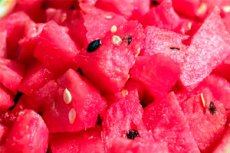
All iLive content is medically reviewed or fact checked to ensure as much factual accuracy as possible.
We have strict sourcing guidelines and only link to reputable media sites, academic research institutions and, whenever possible, medically peer reviewed studies. Note that the numbers in parentheses ([1], [2], etc.) are clickable links to these studies.
If you feel that any of our content is inaccurate, out-of-date, or otherwise questionable, please select it and press Ctrl + Enter.
Watermelon for diabetes
Medical expert of the article
Last reviewed: 03.07.2025

Considering the sweet taste of this largest berry (true, false), the question – can you eat watermelon if you have diabetes type 1 and 2 – comes naturally.
Benefits
When talking about the benefits of watermelon for diabetes (which is often accompanied by obesity), we could start with the calorie content: 100 g of watermelon provide 27.5-30 kcal. Next, it should be noted that it contains vitamins and macro- and microelements. By eating watermelon, we replenish our supply of beta-carotene, vitamins C, B1, B2, PP, folic acid, as well as potassium, magnesium, calcium, phosphorus and iron.
Watermelon quenches thirst well, since it consists of 91% water, increases diuresis, which is why it is recommended to eat it to cleanse the kidneys and bladder - to prevent nephrolithiasis and urolithiasis. The benefits of watermelon for digestion and intestinal health are undeniable - thanks to pectins and cellulose fibers. And, since pectins contain glucuronic acids, watermelon helps remove cholesterol (LDL), which is formed in significantly higher quantities due to insufficient insulin production in type 1 diabetes.
In insulin-dependent diabetes, the body loses a lot of fluid, which leads to a violation of the electrolyte balance in tissue cells. And here the significant content of potassium in watermelon (64 mg%) is very useful.
It is also worth noting the presence of the carotenoid lycopene in the watermelon pulp, which gives it a red color. This antioxidant is good for the health of the heart and bone tissue, skin and vision. In addition, the high level of lycopene in watermelons, according to research reported in the American Journal of Hypertension, helps to reduce blood pressure in hypertensive patients suffering from obesity.
However, it should be remembered that watermelon's calories are provided by easily digestible sugars: glucose, fructose and sucrose, which account for 10-11% of the weight, of which about 8% is fructose. It is not dangerous for diabetes, since it turns into glycogen without the participation of insulin. But if at first there is more fructose in ripe watermelons, then during their storage sucrose takes the lead, immediately increasing the sugar content in the blood.
Therefore, the answer to the questions – can you eat watermelon if you have diabetes and gestational diabetes (which is typical for the period of pregnancy) – seems obvious.
How much watermelon can you eat if you have diabetes?
100 g of watermelon pulp contains 6.2 g of sugar. It would seem that it is not much. But despite all its health benefits, watermelon is a product with a high glycemic index: depending on the degree of ripeness, its GI is 72-92 units.
People with diabetes should eat foods with a low glycemic index, and many diabetics count carbohydrates to help control their blood glucose levels (since carbohydrates are known to convert to glucose).
There are no absolute contraindications regarding watermelon for diabetes. According to experts from the American Diabetes Association, the most acceptable option is to consume 45-65 g of carbohydrate food at one time. And if 150 g of watermelon (pulp) contains 11.5 g of carbohydrates (9.3 g of sugar), then when eating watermelon for dessert, it is necessary to limit the amount of carbohydrates to 30-50 g in other food.
Diabetics should consume foods that contain carbohydrates, but their quantity should be limited, distributed throughout the day – to minimize blood glucose spikes. This could be two servings of fruit a day (and one of them is watermelon), you just need to maintain a balance in the amount of carbohydrates consumed in your menu.
 [ 1 ]
[ 1 ]
Possible risks
Despite the rave reviews about the dietary benefits of watermelon, endocrinologists are asking patients with diabetes to be aware that there are risks to eating fruits that raise blood sugar.
And possible complications after happily eating two or three slices of sweet, juicy watermelon will not be slow in showing themselves with a rapid increase in blood glucose levels.
And that's not all. The high potassium content of watermelon pulp can cause abnormal heart rhythms and other cardiovascular problems in people with severe hyperkalemia (high potassium in the blood).
By the way, if you don’t know, a lack of insulin also disrupts potassium metabolism, so the risk of developing hyperkalemia increases.
 [ 2 ]
[ 2 ]

